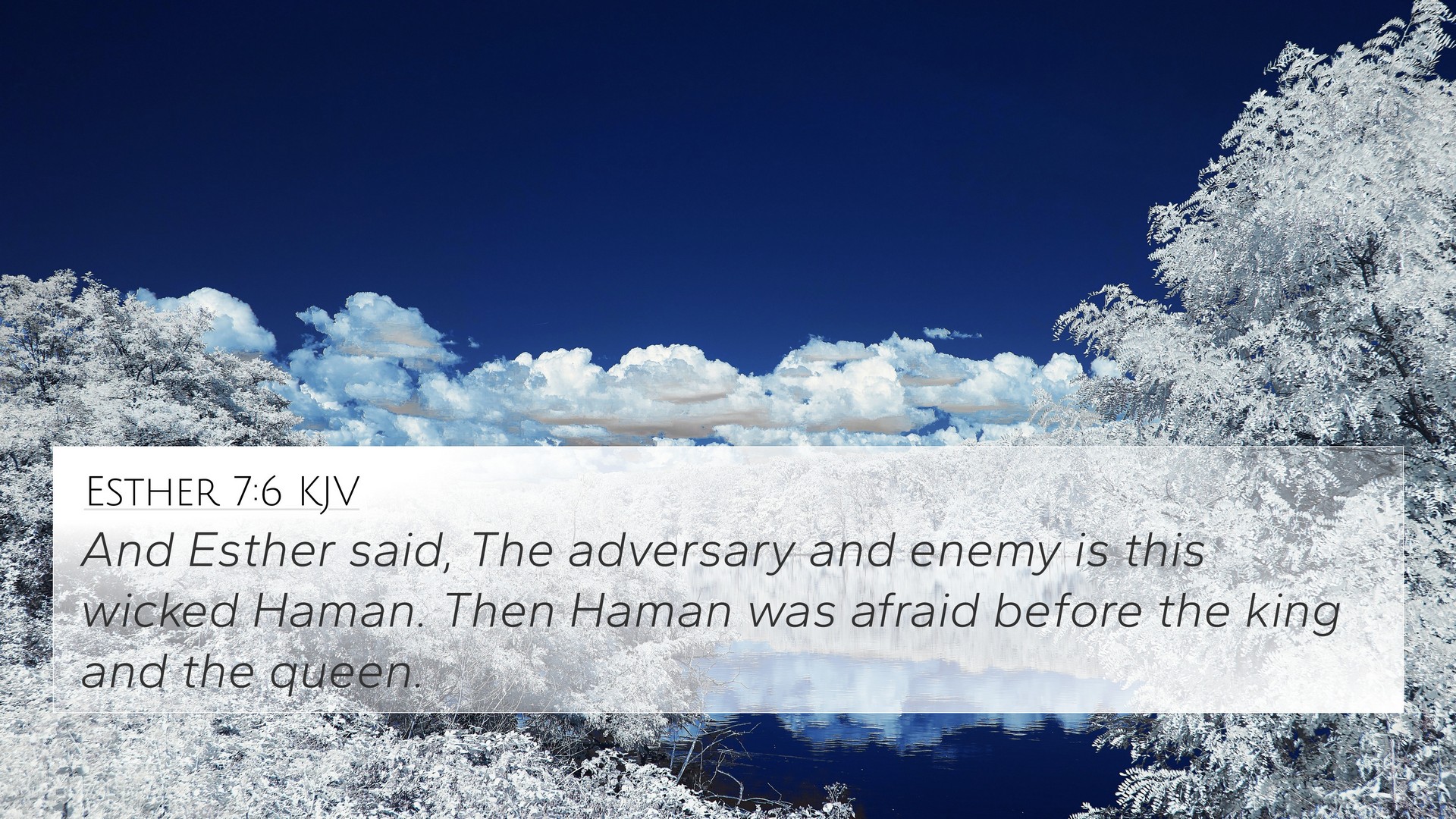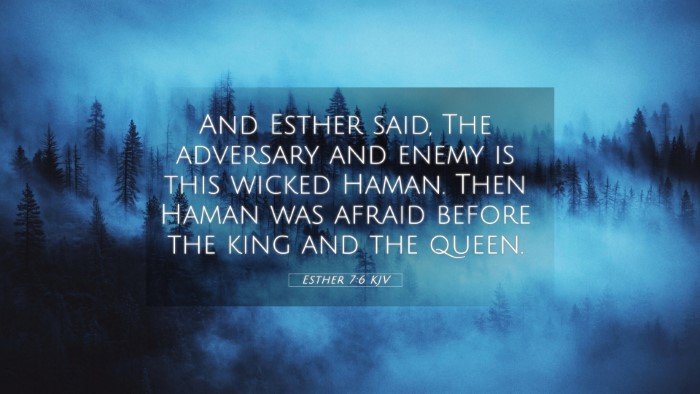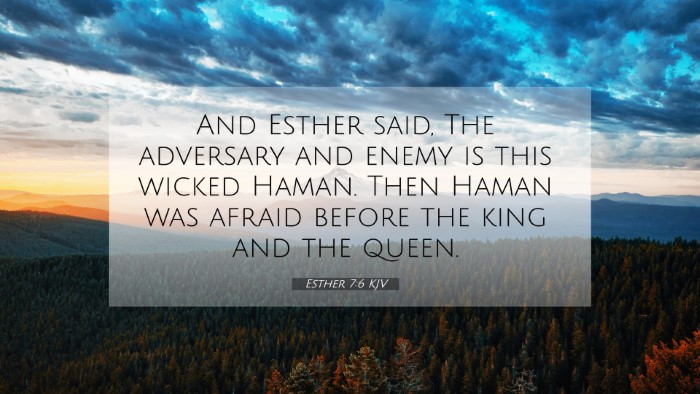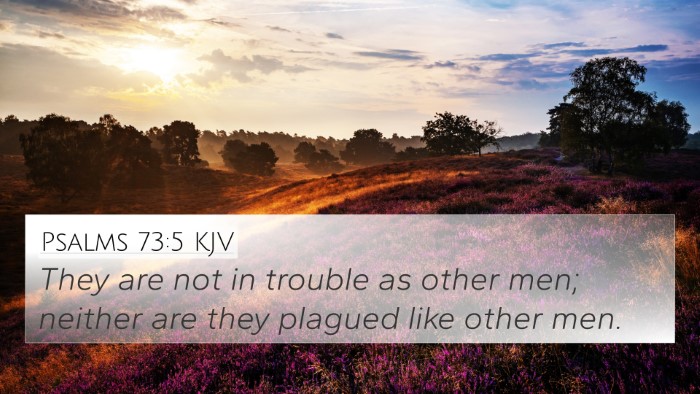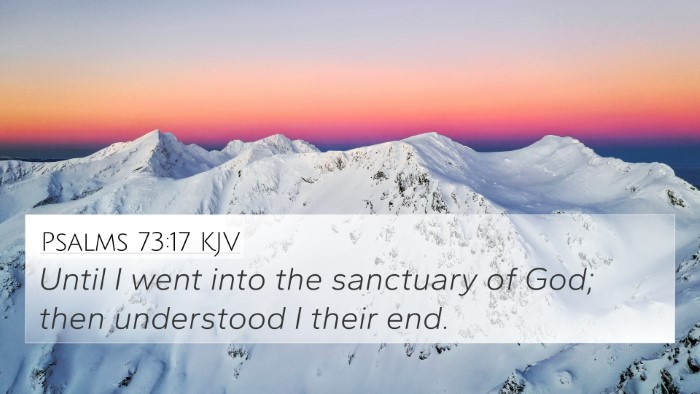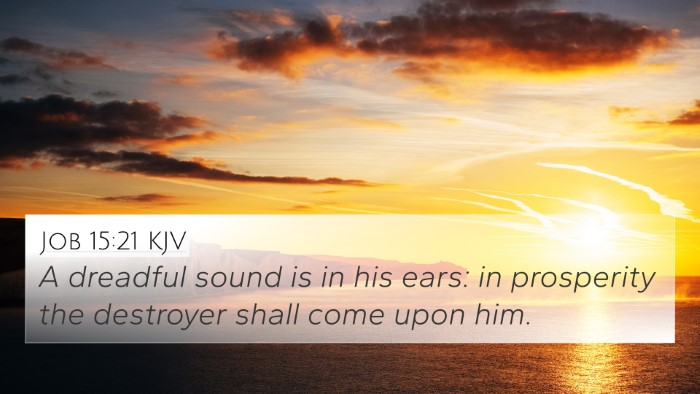Old Testament
Genesis Exodus Leviticus Numbers Deuteronomy Joshua Judges Ruth 1 Samuel 2 Samuel 1 Kings 2 Kings 1 Chronicles 2 Chronicles Ezra Nehemiah Esther Job Psalms Proverbs Ecclesiastes Song of Solomon Isaiah Jeremiah Lamentations Ezekiel Daniel Hosea Joel Amos Obadiah Jonah Micah Nahum Habakkuk Zephaniah Haggai Zechariah MalachiEsther 7:6 Similar Verses
Esther 7:6 Cross References
And Esther said, The adversary and enemy is this wicked Haman. Then Haman was afraid before the king and the queen.
Uncover the Rich Themes and Topics of This Bible Verse
Listed below are the Bible themes associated with Esther 7:6. We invite you to explore each theme to gain deeper insights into the Scriptures.
Esther 7:6 Cross Reference Verses
This section features a detailed cross-reference designed to enrich your understanding of the Scriptures. Below, you will find carefully selected verses that echo the themes and teachings related to Esther 7:6 KJV. Click on any image to explore detailed analyses of related Bible verses and uncover deeper theological insights.
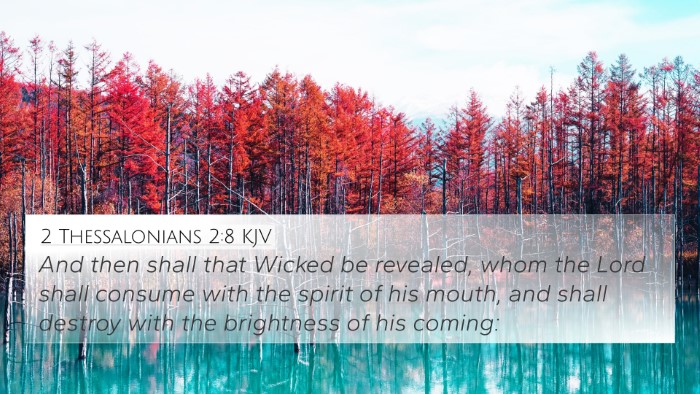
2 Thessalonians 2:8 (KJV) »
And then shall that Wicked be revealed, whom the Lord shall consume with the spirit of his mouth, and shall destroy with the brightness of his coming:
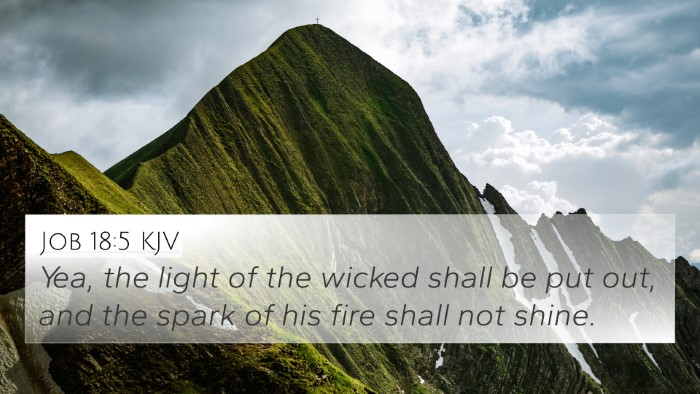
Job 18:5 (KJV) »
Yea, the light of the wicked shall be put out, and the spark of his fire shall not shine.
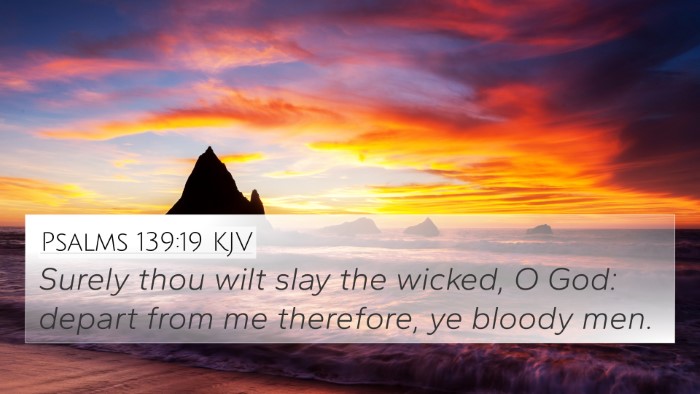
Psalms 139:19 (KJV) »
Surely thou wilt slay the wicked, O God: depart from me therefore, ye bloody men.
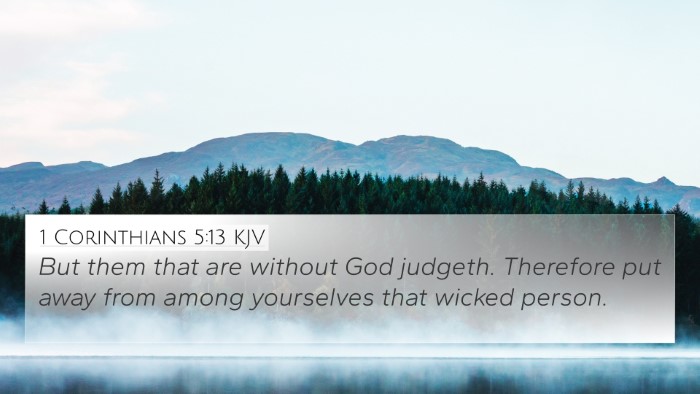
1 Corinthians 5:13 (KJV) »
But them that are without God judgeth. Therefore put away from among yourselves that wicked person.
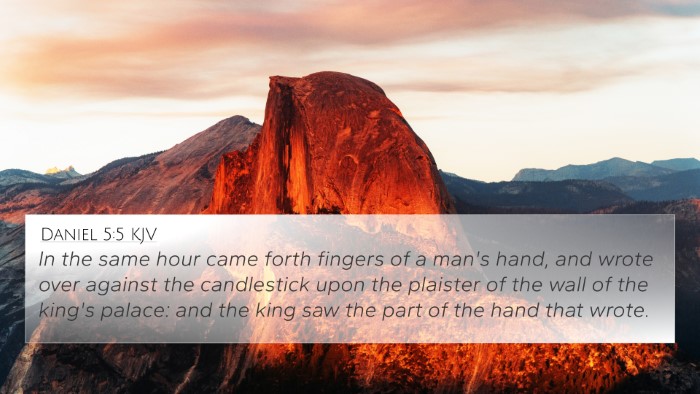
Daniel 5:5 (KJV) »
In the same hour came forth fingers of a man's hand, and wrote over against the candlestick upon the plaister of the wall of the king's palace: and the king saw the part of the hand that wrote.

Isaiah 21:4 (KJV) »
My heart panted, fearfulness affrighted me: the night of my pleasure hath he turned into fear unto me.
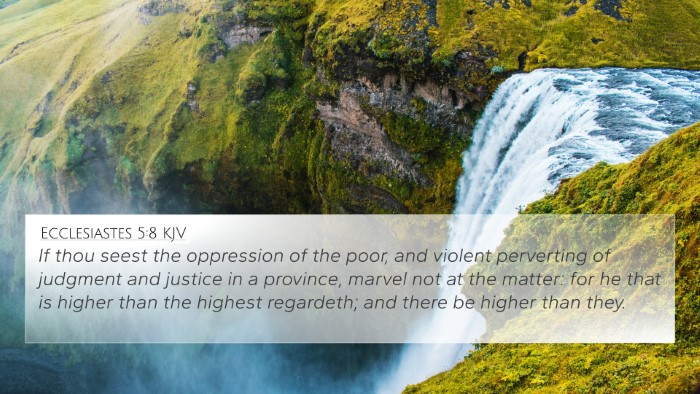
Ecclesiastes 5:8 (KJV) »
If thou seest the oppression of the poor, and violent perverting of judgment and justice in a province, marvel not at the matter: for he that is higher than the highest regardeth; and there be higher than they.
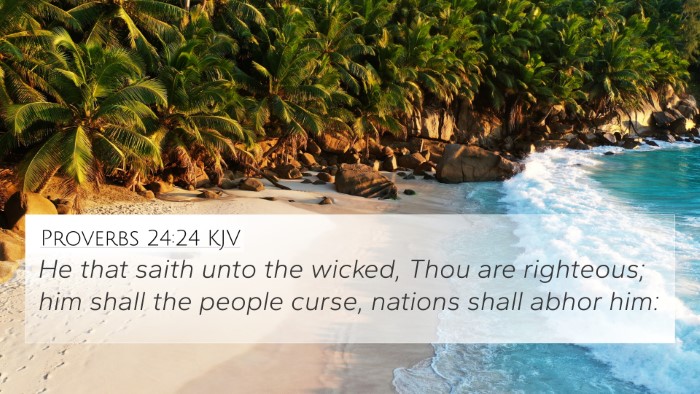
Proverbs 24:24 (KJV) »
He that saith unto the wicked, Thou are righteous; him shall the people curse, nations shall abhor him:
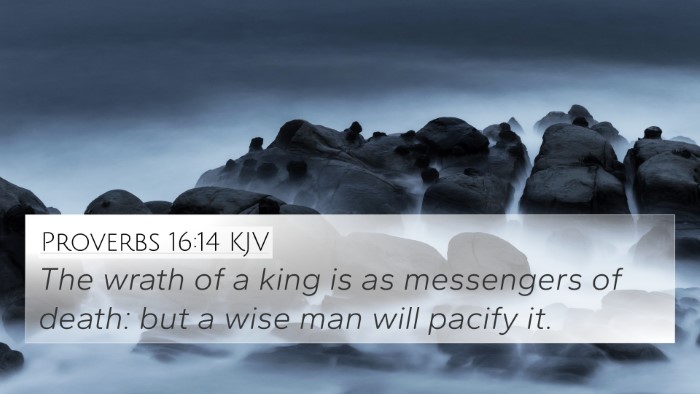
Proverbs 16:14 (KJV) »
The wrath of a king is as messengers of death: but a wise man will pacify it.
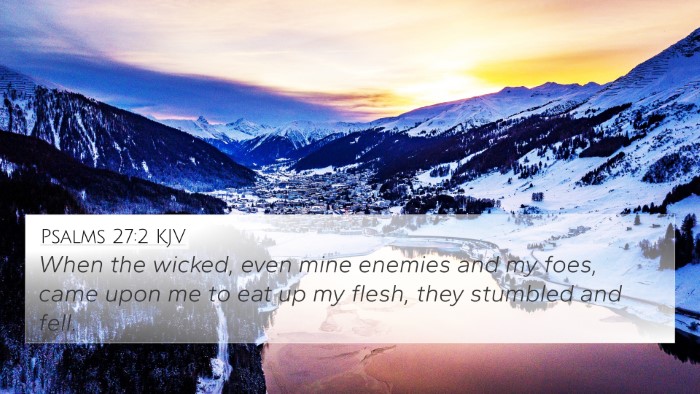
Psalms 27:2 (KJV) »
When the wicked, even mine enemies and my foes, came upon me to eat up my flesh, they stumbled and fell.
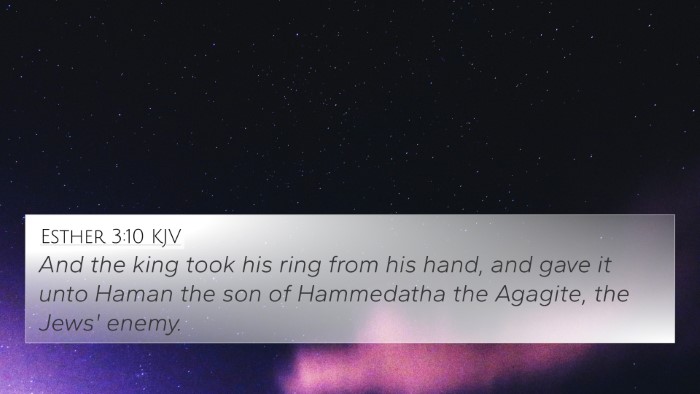
Esther 3:10 (KJV) »
And the king took his ring from his hand, and gave it unto Haman the son of Hammedatha the Agagite, the Jews' enemy.
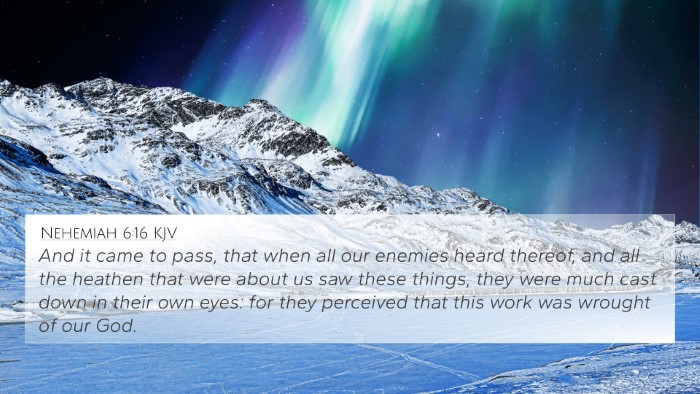
Nehemiah 6:16 (KJV) »
And it came to pass, that when all our enemies heard thereof, and all the heathen that were about us saw these things, they were much cast down in their own eyes: for they perceived that this work was wrought of our God.
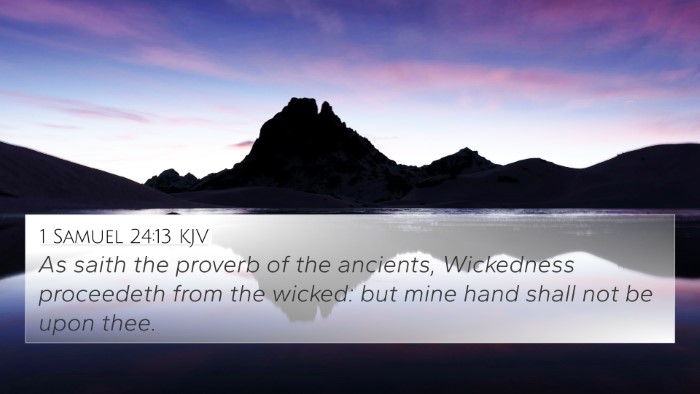
1 Samuel 24:13 (KJV) »
As saith the proverb of the ancients, Wickedness proceedeth from the wicked: but mine hand shall not be upon thee.
Esther 7:6 Verse Analysis and Similar Verses
Understanding Esther 7:6
Verse: "And Esther said, The adversary and enemy is this wicked Haman. Then Haman was afraid before the king and the queen." (Esther 7:6)
Summary of Biblical Context
The Book of Esther narrates the story of a Jewish woman, Esther, who rises to become queen of Persia. In this particular verse, Esther reveals Haman's plot against her people to King Ahasuerus, which marks a turning point in the narrative. Haman's treachery is exposed, leading to his downfall.
Insights and Interpretations
- Matthew Henry: Henry notes that Esther's courageous revelation of Haman's intentions showcases not only her bravery but also her trust in divine providence. By exposing Haman, she acts as an advocate for her people.
- Albert Barnes: Barnes emphasizes the significance of Esther's words—her identification of Haman as the "adversary and enemy" highlights the personal nature of the threat, not just to the Jews but to Esther herself. This dual danger elevates the urgency of her claims.
- Adam Clarke: Clarke discusses the emotional weight of the moment; Haman's fear reflects a divine justice being served. Clarke articulates how Esther's role as queen places her in a position to mediate between the king and her people, demonstrating her unique influence in the palace.
Thematic Connections
This verse not only serves as a pivotal moment in Esther’s narrative but also connects to larger Biblical themes such as:
- Divine Justice: The exposure of evil and protection of the innocent is a recurring theme throughout Scripture.
- Courage in Adversity: Esther's bravery resonates with other scriptural figures who stood firm in the face of danger.
- Providence of God: The unfolding of events illustrates how God orchestrates circumstances, as seen in the overall plot of the Israelites’ deliverance.
Cross-References to Consider
Esther 7:6 connects with several other Bible verses, helping to deepen understanding through cross-references:
- Exodus 17:8-13: The defeat of Amalekites, a foreshadowing of the enmity Haman represents.
- Psalms 7:14-16: Reflecting the consequences of wicked plots against the righteous.
- Proverbs 28:10: Speaks about how those who lead the righteous astray will ultimately fall into their own traps.
- Isaiah 54:17: Assurance that no weapon formed against God's people shall prosper, aligning with Esther’s plight.
- Romans 8:31: Affirmation of God’s support for His people against their adversaries.
- Matthew 10:28: The fear of what can happen to the body versus the soul resonates with Haman's fear before the king.
- Acts 13:10: The dynamics of confronting evil are also illustrated in New Testament contexts.
Discussion on Cross-Referencing
Cross-referencing biblical texts such as Isaiah 54:17 can reveal thematic parallels, such as the assurance of divine protection in times of conflict. Similarly, analyzing Romans 8:31 alongside Esther 7:6 illustrates God's overarching control over human affairs, affirming that He works through the faith and courage of individuals like Esther.
The Role of Courage and Advocacy
In Esther 7:6, we witness not just a moment of revelation but a profound act of advocacy on behalf of her people. This aligns with biblical exhortations to speak out against injustice, echoing through other texts such as Proverbs 31:8-9, which encourages speaking for those unable to defend themselves, and Micah 6:8, which highlights the call to do justice.
Conclusion
Esther 7:6 serves as a powerful reminder of the importance of standing up against evil, the necessity of courage in advocacy, and the assurance of divine justice. By exploring biblical cross-references, such as Matthew 5:10, we see a fuller picture of the themes of righteousness in the face of adversity. When examining scriptural connections, we not only enhance our understanding of individual verses but also uncover the profound interwoven nature of God's message through the entirety of Scripture.
